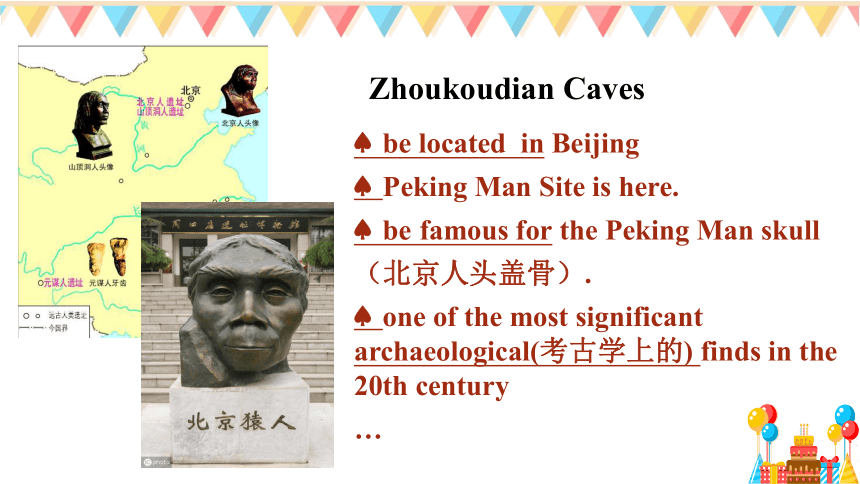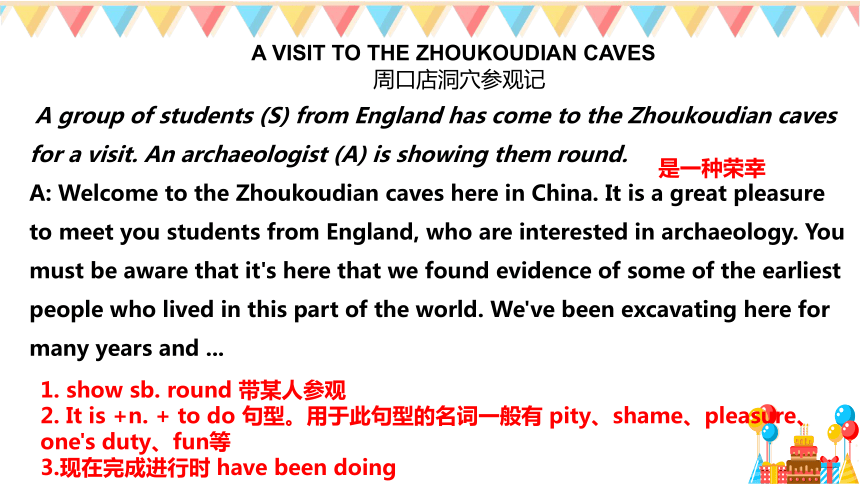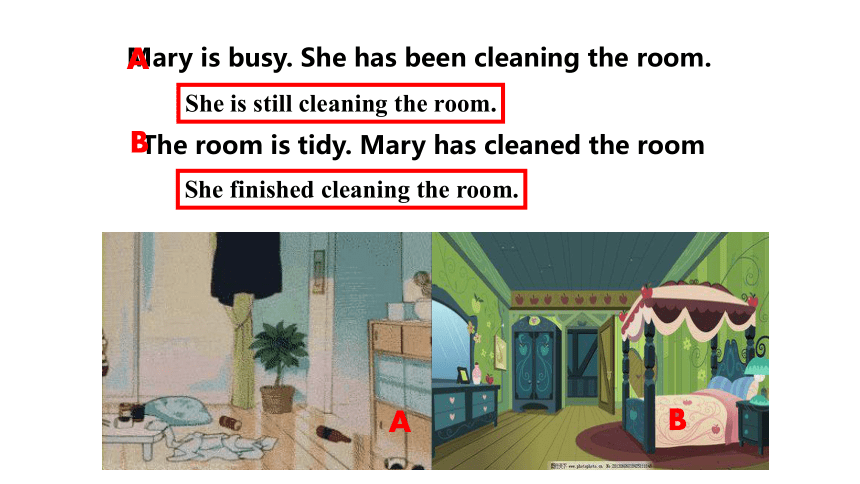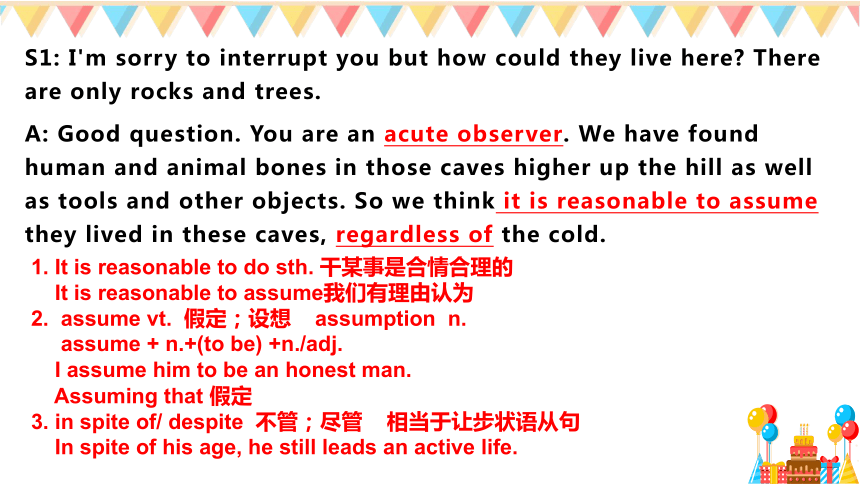选修8 Unit 5 Meeting your ancestors reading I课件(11张ppt)
文档属性
| 名称 | 选修8 Unit 5 Meeting your ancestors reading I课件(11张ppt) |  | |
| 格式 | zip | ||
| 文件大小 | 2.0MB | ||
| 资源类型 | 教案 | ||
| 版本资源 | 人教版(新课程标准) | ||
| 科目 | 英语 | ||
| 更新时间 | 2020-05-03 16:44:15 | ||
图片预览





文档简介
(共11张PPT)
Zhoukoudian Caves
?be located in Beijing
?Peking Man Site is here.
?be famous for the Peking Man skull
(北京人头盖骨).
?one of the most significant archaeological(考古学上的) finds in the 20th century
…
A VISIT TO THE ZHOUKOUDIAN CAVES
周口店洞穴参观记
A group of students (S) from England has come to the Zhoukoudian caves for a visit. An archaeologist (A) is showing them round.
A: Welcome to the Zhoukoudian caves here in China. It is a great pleasure to meet you students from England, who are interested in archaeology. You must be aware that it's here that we found evidence of some of the earliest people who lived in this part of the world. We've been excavating here for many years and ...
1. show sb. round 带某人参观
2. It is +n. + to do 句型。用于此句型的名词一般有 pity、shame、pleasure、one's duty、fun等
3.现在完成进行时 have been doing
是一种荣幸
A. the present perfect tense 现在完成时
B. the present perfect continuous tense 现在完成进行时
1.________is used to talk about an action completed in the past but are connected with the present.
2. _________is used to talk about an action that started in the past and is still happening or a non-stop action or a repeated action until recently.
A
B
Mary is busy. She has been cleaning the room.
The room is tidy. Mary has cleaned the room.
A
B
A
B
She finished cleaning the room.
She is still cleaning the room.
S1: I'm sorry to interrupt you but how could they live here? There are only rocks and trees.
A: Good question. You are an acute observer. We have found human and animal bones in those caves higher up the hill as well as tools and other objects. So we think it is reasonable to assume they lived in these caves, regardless of the cold.
1. It is reasonable to do sth. 干某事是合情合理的
It is reasonable to assume我们有理由认为
2. assume vt. 假定;设想 assumption n.
assume + n.+(to be) +n./adj.
I assume him to be an honest man.
Assuming that 假定
3. in spite of/ despite 不管;尽管 相当于让步状语从句
In spite of his age, he still leads an active life.
S2: How did they keep warm? They couldn't have mats, blankets or quilts like we do. It must have been very uncomfortable.
A: We've discovered fireplaces in the centre of the caves where they made fires. That would have kept them warm, cooked the food and scared wild beasts away as well. We have been excavating layers of ash almost six metres thick, which suggests that they might have kept the fire burning all winter. We haven't found any doors but we think they might have hung animal skins at the cave mouth to keep out the cold during the freezing winter.
S3: What wild animals were there all that time ago?
A: Well, we've been finding the bones of tigers and bears in the caves, and we think these were their most dangerous enemies. Now what do you think this tells us about the life of these early people? (shows picture of a sewing needle)
S2.: Gosh! That's a needle. Goodness, does that mean they repaired things?
A: What else do you think it might have been used for?
S4: Let me look at it. It's at most three centimetres long. Ah yes, it seems to be made of bone. I wonder how they made the hole for the ...
S2: (interrupting) Do you mean that they made their own clothes? Where did they get the material?
A: They didn't have material like we have today. Can you guess what they used?
Sl: Wow! Did they wear clothes made entirely of animal skins? How did they prepare them? I'm sure they were quite heavy to cut and sew together.
A: Our evidence suggests that they did wear clothes made from animal skins. We continue discovering tools that were sharpeners for other tools. It seems that they used the sharpened stone tools to cut up animals and remove their skin. Then smaller scrapers were
cut out 切去;省略; 停止做某事
cut down ①砍倒(树等)② 削减;减少 cut down on smoking 减少吸烟
cut off ①切掉;割掉;砍掉;剪掉 ②中断,切断(水、电、煤气等的供应)
cut in (= interrupt) 插嘴;打断别人谈话
cut through 抄近路穿过;走近路
probably used to remove the fat and meat from the skin. After that they would rub an ample amount of salt onto the skin to make it soft. Finally, they would cut it and sew the pieces together. Quite a difficult and messy task! Now look at this. (shows a necklace)
ample adj.足够的;充足的;富裕的 adequate adj. 适当的;足够的
appropriate adj.适当的;正当的 abundant adj. 丰富的;充裕的
S2:Why, it's a primitive necklace. Did early people really care about their appearance like we do? It's lovely!
A:Yes, and so well preserved. What do you think it's made of?.
S4:Let me see. Oh, I think some of the beads are made of animal bones but others are made of shells.
A:How clever you are! One bone is actually an animal tooth and the shells are from the seaside. Can you identify any other bones?
S1:This one looks very much like a fish bone. Is that reasonable?
①保护;维护 preserve … from / against 保护……免受……伤害
②维持……的现状;保存;保养 preserve one’s strength n. 保护区
reserve vt. ①预定,预约(座位、席位、房间等)②保留;储备 n.保护区
observe vt. 观察;观测;遵守;庆祝(节日等)
deserve vt. 值得;应受
A:Yes, indeed, as the botanical analyses have shown us, all the fields around here used to be part of a large shallow lake. Probably there were fish in it.
S3:But a lake is not the sea. We are miles from the sea, so how did the seashells get here?
A:Perhaps there was trade between early peoples or they travelled to the seaside on their journeys. We know that they moved around, following the herds of animals. They didn't grow their own crops, but picked fruit when it ripened and hunted animals. That's why they are called hunters and gatherers. Now, why don't we go and visit the caves?
Zhoukoudian Caves
?be located in Beijing
?Peking Man Site is here.
?be famous for the Peking Man skull
(北京人头盖骨).
?one of the most significant archaeological(考古学上的) finds in the 20th century
…
A VISIT TO THE ZHOUKOUDIAN CAVES
周口店洞穴参观记
A group of students (S) from England has come to the Zhoukoudian caves for a visit. An archaeologist (A) is showing them round.
A: Welcome to the Zhoukoudian caves here in China. It is a great pleasure to meet you students from England, who are interested in archaeology. You must be aware that it's here that we found evidence of some of the earliest people who lived in this part of the world. We've been excavating here for many years and ...
1. show sb. round 带某人参观
2. It is +n. + to do 句型。用于此句型的名词一般有 pity、shame、pleasure、one's duty、fun等
3.现在完成进行时 have been doing
是一种荣幸
A. the present perfect tense 现在完成时
B. the present perfect continuous tense 现在完成进行时
1.________is used to talk about an action completed in the past but are connected with the present.
2. _________is used to talk about an action that started in the past and is still happening or a non-stop action or a repeated action until recently.
A
B
Mary is busy. She has been cleaning the room.
The room is tidy. Mary has cleaned the room.
A
B
A
B
She finished cleaning the room.
She is still cleaning the room.
S1: I'm sorry to interrupt you but how could they live here? There are only rocks and trees.
A: Good question. You are an acute observer. We have found human and animal bones in those caves higher up the hill as well as tools and other objects. So we think it is reasonable to assume they lived in these caves, regardless of the cold.
1. It is reasonable to do sth. 干某事是合情合理的
It is reasonable to assume我们有理由认为
2. assume vt. 假定;设想 assumption n.
assume + n.+(to be) +n./adj.
I assume him to be an honest man.
Assuming that 假定
3. in spite of/ despite 不管;尽管 相当于让步状语从句
In spite of his age, he still leads an active life.
S2: How did they keep warm? They couldn't have mats, blankets or quilts like we do. It must have been very uncomfortable.
A: We've discovered fireplaces in the centre of the caves where they made fires. That would have kept them warm, cooked the food and scared wild beasts away as well. We have been excavating layers of ash almost six metres thick, which suggests that they might have kept the fire burning all winter. We haven't found any doors but we think they might have hung animal skins at the cave mouth to keep out the cold during the freezing winter.
S3: What wild animals were there all that time ago?
A: Well, we've been finding the bones of tigers and bears in the caves, and we think these were their most dangerous enemies. Now what do you think this tells us about the life of these early people? (shows picture of a sewing needle)
S2.: Gosh! That's a needle. Goodness, does that mean they repaired things?
A: What else do you think it might have been used for?
S4: Let me look at it. It's at most three centimetres long. Ah yes, it seems to be made of bone. I wonder how they made the hole for the ...
S2: (interrupting) Do you mean that they made their own clothes? Where did they get the material?
A: They didn't have material like we have today. Can you guess what they used?
Sl: Wow! Did they wear clothes made entirely of animal skins? How did they prepare them? I'm sure they were quite heavy to cut and sew together.
A: Our evidence suggests that they did wear clothes made from animal skins. We continue discovering tools that were sharpeners for other tools. It seems that they used the sharpened stone tools to cut up animals and remove their skin. Then smaller scrapers were
cut out 切去;省略; 停止做某事
cut down ①砍倒(树等)② 削减;减少 cut down on smoking 减少吸烟
cut off ①切掉;割掉;砍掉;剪掉 ②中断,切断(水、电、煤气等的供应)
cut in (= interrupt) 插嘴;打断别人谈话
cut through 抄近路穿过;走近路
probably used to remove the fat and meat from the skin. After that they would rub an ample amount of salt onto the skin to make it soft. Finally, they would cut it and sew the pieces together. Quite a difficult and messy task! Now look at this. (shows a necklace)
ample adj.足够的;充足的;富裕的 adequate adj. 适当的;足够的
appropriate adj.适当的;正当的 abundant adj. 丰富的;充裕的
S2:Why, it's a primitive necklace. Did early people really care about their appearance like we do? It's lovely!
A:Yes, and so well preserved. What do you think it's made of?.
S4:Let me see. Oh, I think some of the beads are made of animal bones but others are made of shells.
A:How clever you are! One bone is actually an animal tooth and the shells are from the seaside. Can you identify any other bones?
S1:This one looks very much like a fish bone. Is that reasonable?
①保护;维护 preserve … from / against 保护……免受……伤害
②维持……的现状;保存;保养 preserve one’s strength n. 保护区
reserve vt. ①预定,预约(座位、席位、房间等)②保留;储备 n.保护区
observe vt. 观察;观测;遵守;庆祝(节日等)
deserve vt. 值得;应受
A:Yes, indeed, as the botanical analyses have shown us, all the fields around here used to be part of a large shallow lake. Probably there were fish in it.
S3:But a lake is not the sea. We are miles from the sea, so how did the seashells get here?
A:Perhaps there was trade between early peoples or they travelled to the seaside on their journeys. We know that they moved around, following the herds of animals. They didn't grow their own crops, but picked fruit when it ripened and hunted animals. That's why they are called hunters and gatherers. Now, why don't we go and visit the caves?
